
One thing that has made reading this book both exciting and humbling for me so far is the fact that Fraser’s vocabulary exceeds mine by leaps and bounds. I just finished writing my doctoral dissertation, so I’d hardly consider myself a lexically challenged simpleton. However, I find myself needing to stop and look up words frequently, sometimes at the rate of once or twice per page. As a fun exercise in admiration for the author, I thought I’d log all the words I had to look up in this chapter along with their definitions. To quote a popular expression, “Yo, don’t judge.”
- Penury: severe poverty, lack of resources, or extreme frugality
- Laconically: using a minimum of words, concise to the point of seeming rude or mysterious
- Redound: to have an effect, either for good or for bad
- Abject: experienced to the maximum degree
- Sortie: an attack
- Sardonic: mocking, humorous in an unkind manner
- Drayman: one who hauls goods for a living
- Stultifying: causing to seem stupid, impairing, or inhibiting
- Phaeton: a type of open carriage pulled by two horses
- Fabulism: giving false accounts of things
- Inchoate: not yet fully-formed, rudimentary
Now that this brief return to my high school English class days is over, on with the chapter.
It hadn’t struck me until reading in this book how much actions as minor as plowing fields and planting crops can change the climate of an area. The climate change we talk about today seems so much bigger than the one that caused the Wilders to leave South Dakota, but the era and lack of technology made even small changes have larger repercussions. I knew of the Dust Bowl and other tough periods for American heartland farmers, but not until reading this book did I understand that “the great plow-up,” as Ken Burns called it in his Dust Bowl documentary, was really a sham to begin with.
It’s hard for me not to think that Rose’s description of Laura’s teary goodbye to Dakota was romanticized to the point where it is far from the truth. First, did Almanzo ever address her as “Laura?” If he did, that would be news to me. Second, it contrasts so greatly with the tone of her diary about the same part of their trip.
On the topic of Rose, this seems to be a point at which the book shifts more from her mother’s writings to hers. When my wife, Karen, finished this book, she was left with a really bad taste for Rose, and I am starting to see why I have heard so many Wilder scholars and fans say things like: “I don’t like her.” “She was so angry at the world.” In this chapter, I see such hypocrisy in her disdain for the “barefooted mountain girls,” at her school in Mansfield, when her own family had so little themselves when they first moved there. I guess it’s part of human nature or maybe specifically a part of American culture to look down on others as a way to feel better about our own lots in life. I guess one doesn’t feel as helpless if one can say, “It could be worse. I could be like those people.”
The description of Charles’s death makes me reflect on his life and come to some mixed conclusions. As many others have noted, it seems like he never got to live out his dream of homesteading and farming the land. By the time he finally had the land that is the Ingalls Homestead today, he left it, moved to town, and worked there. As I previously mentioned, one feels like the entire Homestead Act was was a big sham. However, according to Laura’s writing, the constant moving and satisfying his wanderlust were what kept Charles happy. Even if he had raised bumper crops in Kansas or Minnesota, that might not have been as fulfilling as the life he had.
The disdain for Rose being said, Fraser’s description of her senior year of high school makes her sound like an interesting person. It seems like she reserved her scorn for her family and lumped them in with the country bumpkins of Mansfield, but gave the rest of the world a chance.
I love Fraser’s description of newspapers in the early 20th century: “Journalistic standards regarding accuracy, attention to detail, and proper sourcing mattered little.” It’s so similar to the “clickbait” and “fake news” with which the world is struggling so much today.
In closing, as someone who has never read On the Way Home and has read only parts of West From Home, this was an enlightening chapter about times in Laura’s life that the other books do not cover. We see how economic stability and new opportunities for women during the changing social times allowed Laura to discover her true gifts as an author.
PS. I can’t help reading about the large picture windows in the Rocky Ridge farmhouse without chuckling about the “Divorce, Walnut Grove Style” episode of the show. That episode’s cheezy running gag involves Charles buying a similar window that keeps getting broken. I apologize to all the book purists whose ire I just drew and whose bonnets I just got in a wad.


Comment1
Appreciate your chiming in, Kevin. You are right. That list of words looked like a vocabulary list from my Senior English class.
Very Shakespearian words! Gotta love a man who delves into learning about one of his wife’s passions.
Comments are closed.